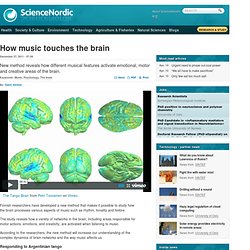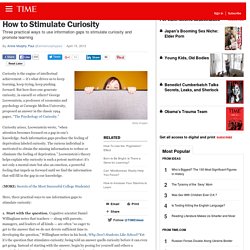

Sharp Thinking. How music touches the brain. Finnish researchers have developed a new method that makes it possible to study how the brain processes various aspects of music such as rhythm, tonality and timbre.

The study reveals how a variety of networks in the brain, including areas responsible for motor actions, emotions, and creativity, are activated when listening to music. According to the researchers, the new method will increase our understanding of the complex dynamics of brain networks and the way music affects us. Responding to Argentinian tango.
Consciousness. Mental. The Mind and other Dangerous Things. Neuroscience. Genetics. Teaching, Learning, Coaching and Paedagagogy. Wellness. Psychology of Teams. Manipulation. Positive psychology. Mindfulness. Psychology. How to Stimulate Curiosity and Promote Learning. Curiosity is the engine of intellectual achievement — it’s what drives us to keep learning, keep trying, keep pushing forward.

But how does one generate curiosity, in oneself or others? George Loewenstein, a professor of economics and psychology at Carnegie Mellon University, proposed an answer in the classic 1994 paper, “The Psychology of Curiosity.” Curiosity arises, Loewenstein wrote, “when attention becomes focused on a gap in one’s knowledge. Such information gaps produce the feeling of deprivation labeled curiosity.
Podcasts. Psychology Resources Archive. Less Empathy Toward Outsiders: Brain Differences Reinforce Preferences For Those In Same Social Group. An observer feels more empathy for someone in pain when that person is in the same social group, according to new research in the July 1 issue of The Journal of Neuroscience.

The study shows that perceiving others in pain activates a part of the brain associated with empathy and emotion more if the observer and the observed are the same race. The findings may show that unconscious prejudices against outside groups exist at a basic level. The study confirms an in-group bias in empathic feelings, something that has long been known but never before confirmed by neuroimaging technology. Researchers have explored group bias since the 1950s. IVY COLLEGES( YALE UNIVERSITY) FREE COURSES. Psychology Team.
Energy Psychology. Psychology.